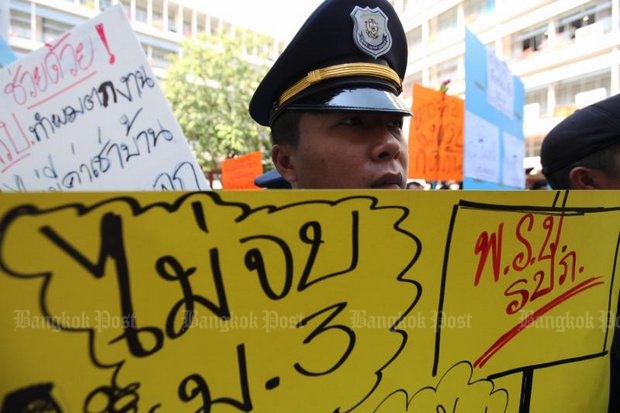
A new law to regulate the security guard business has sparked growing concerns among their workers as they are afraid to lose their jobs.
Under the new law on the security service business which takes effect on March 4, security guards are required to be Thai nationals aged over 18 and have completed at least Matthayom 3 (ninth grade).
They must also undergo a security training course at centres certified by the government's registrar before receiving their security guard licences.
Those who breach the law will face up to three months in jail, a fine of up to 5,000 baht or both.
Despite the government's efforts to standardise the security service business for the sake of the public's safety and orderliness, the education qualification requirement has drawn major concerns among guard workers as most of them have finished only Prathom 6 (sixth grade).
Last week, more than 100 people from the Security Services Union submitted a petition to Prime Minister Prayut Chan-o-cha at Government House, urging him to delay the law. Thanaphol Pholyiem, secretary-general of the union, said he believed the government wanted to make money from licence fees as they were in a hurry to enact the law without conducting a study or opinion surveys on the issue with business operators.
Under the law, security guards are required to pay 2,000 baht to 6,000 baht for security training with the Royal Thai Police, despite the fact that security business providers annually pay taxes to the government.
Business operators have to register their company name with a specific title -- "security service company" -- which will limit companies' options as several of them also provided cleaning services as well.
Boonrat, 50, who has been working as a security guard for 15 years, said if the government did not ease some criteria under the new law, many guards will lose their jobs.
Jamnien, another security guard who earns 450 baht per day, said the law should not regulate the educational background of workers.
Business operators currently assign their workers with tasks in accordance with their education and skills, which also affect their salaries.
Watcharapol Bussamongkol, president of the Security Services Association of Thailand (SSAT), said even though the law stipulated people aged over 18 years who completed at least Matthayom 3 will be allowed to work as guards, current workers will not be affected as they were exempt, according to the law.
However, business proprietors had to submit a list of their current employees to the government's registrar within 90 days of the law taking effect.
On the other hand, although this new law will have a huge impact on security service providers and their employees, it was regarded as the government's effort to standardise the country's security business, said Mr Watcharapol.
According to the SSAT, about 400,000 guards are working in more than 3,000 security service firms nationwide.
Of them, 5% are migrant workers and another 5% are people with criminal records.
These two groups will be directly affected by the new law.
Those who were charged with sexual offences will be banned from working as guards while people who have criminal records will not be employable until three years after being freed from prison.
"Most security service firms will not recruit migrant workers as security guards due to the language barrier problem," Mr Watcharapol said.